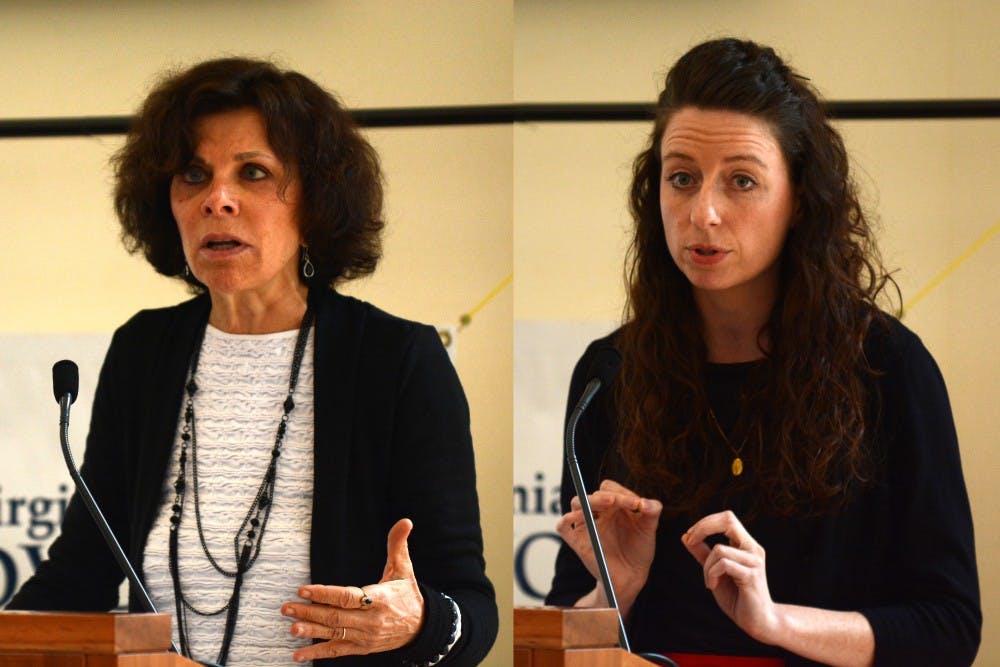The University Law School hosted a debate Tuesday in which panelists discussed the legality of abortion in the United States and the ethical implications of the practice. More than 100 attendees were present at the event. The Advocates for Life at Virginia Law and the University and the University Law School Federalist Society also co-sponsored the event.
The featured panelists at the debate were Stephanie Gray and Nadine Strossen. Gray is a Canadian pro-life activist, founder of Love Unleashes Life and former executive director and co-founder of the Canadian Center for Bioethical Reform, which condemns all forms of abortion. Strossen is the former president of the American Civil Liberty Union — which advocates for the constitutional right of abortion — a founding member of Feminists for Free Expression and a professor at New York Law School.
Betsy Hedges, a member of the Advocates for Life at Virginia Law, moderated the event.
Gray and Strossen were allotted 15 minutes each for openings, 10 each for reponses, five each for cross examination and three each for closing remarks — all before Hedges opened up the the floor for questions.
Gray presented the argument against the legalization of abortion on the grounds that it is a violation of human rights and said that fetuses are humans and are thus worthy of these rights.
“We would never deny that someone is a human after birth, so neither should we say that they weren’t human before birth … because the entity is growing, we know the entity is living,” Gray said.
Gray added that since an unborn fetus is no less human than a newborn child, a mother’s decision to abort a child in the womb should be met with the same punishment as when an individual commits murder.
During her comments, Gray displayed a slideshow containing images of aborted fetuses.
Gray argued that abortion should not be legal as mothers in civilized societies “don’t kill children.”
“[Mothers] by nature in civil societies don’t kill children.. so should abortion be legal?” Gray said. “You must first ask what does civil society ask of us as parents, and expecting them to care for children, abortion should not be legal.”
After Gray spoke, Strossen discussed the legal legitimacy of abortion based on constitutional history and legality.
“Abortion is definitively a legal right, as been established by every single ideologically diverse Supreme Court justice who has ruled on this issue,” Strossen said. “Abortion is also morally right … of course many people, including Stephanie, think abortion is morally wrong … but it is precisely because we individually each have differing views on this profoundly personal moral issue… [that] no law, no government official, should have the power to guard any women from making this extraordinarily important decision consistent with her own moral and religious views.”
In response, Gray said a woman’s decision to abort a child was not a protected right.
“I support a woman’s right to wear black shoes over the red shoes,” Gray said. “I don’t support a women’s right … to choose to kill her offspring.”
During her rebuttal, Strossen argued that aborting a child is not an act of poor parenting, but rather a mature effort to prevent a child from being brought into the world by a mother who is not yet suitable to be a parent.
“Most women who do have abortions are women who chose to be mothers, just not necessarily at that particular point,” Strossen said. “The major reason women have abortions in this country is unfortunately due to the economic inequality, and the conclusion that they do not have the economic wherewithal to become effective parents.”
After a heated session of cross examining one another, Strossen and Gray attempted to seek common ground. Strossen suggested that the best way to avoid abortion is to prevent unwanted pregnancies from happening in the first place through the implementation of better sexual education programs in schools. Strossen also called for the creation of sufficient childcare programs that can support mothers who decide to continue with their pregnancies.
Some of the organizations represented included at the event included the Hope on Grounds outreach club for those who have experienced sexual assault and need assistance dealing with the effects following attacks, such as unwanted pregnancies.
Holly Freeborn, the education and outreach coordinator for Hope on Grounds, said the decision to support abortion rests with individuals rather than governments.
“I don't like to be pro anything,” Freeborn said. “I like to personally say that I believe in human rights… it is an individual decision… but at the end of the day we need to just support each other.”







